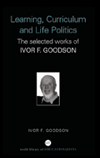| Book chapters |
Learning, Curriculum and Life PoliticsIntroductionThe compilation of a set of collected works brings with it the problem of developing criteria for selection; what lines of thought are to be favoured or downplayed or deleted. For after thirty years or so of writing, the shape of ones thinking only really emerges fully with this advantage of hindsight. But this itself is to privilege the retrospective selection over the full developmental diversity of avenues of investigation. For in truth our studies go off in many directions – some prove fruitful, some rapidly become cul-de-sacs; some lie dormant and then accelerate rapidly, whilst others blossom early but then fade gradually. All of this only becomes clear later.
This collection tends to work backwards in some ways from my current work on life histories, professional life and work, and life politics; but to counter this whiggishness it also tries to work in the opposite direction following the chronology of scholarly concerns with learning, pedagogy and curriculum and following these through to the present day.
My recent research location has been rather fortunate and quite unexpected. Having spent five years working on the Spencer Foundation project Change Over Time (1998–2003) I have completed a set of essays and books that pull together a range of research on professionalisation and life history. This work was undertaken whilst at the University of Western Ontario in Canada and mostly at the Warner Graduate School in the University of Rochester in New York State. Upon returning to work in my home country, apart from the considerable joy at home-coming, I was planning to write a number of books which summarised my educational thinking. For the moment this has been forestalled by the award of two large longitudinal research grants. The first is part of the UK Governments Teaching and Learning Programme and is funded by the Economic and Social Research Council, the project Learning Lives: Learning, Identity and Agency in the Life-Course is concerned to understand learning in a variety of milieu across the life course and employs a life history methodology in pursuit of this data. Alongside this the European Union has funded a complimentary four-year project which studies Professional Knowledge in eight European countries. Again a life history approach is employed. Hence in the years through until 2008/09 the work on learning, curriculum and life politics will be grounded within two highly generative research programmes. Hopefully therefore these themes will achieve greater focus and clarity as a result. At the heart of so much of my research is a belief that we have to understand the personal and biographical if we are to understand the social and political. This far from unique insight nonetheless allows us to scrutinise the educational enterprise from a highly productive vantage point. So much of recent writing on educational and social change, and likewise so many new governmental initiatives, across Western societies have proceeded in denial or ignorance of the personal missions and biographical trajectories of key personnel. Whilst this often provides evidence of ‘symbolic action’ to electorates or professional audiences the evidence at the level of service delivery is often far less impressive. Sometimes the symbolic enshrinement of targets, tests, and tables whilst winning wide constituency support at the outset proves later to have had often negligible or even contradictory effects at the point of delivery. The point of contradiction is often the ignorance or denial of personal missions and biographical mandates. These therefore seem a good place to locate our studies (and indeed our policies) not reluctantly at the end of a process but enthusiastically at the beginning. For this reason, above all, I have tried to practice what I preach by beginning with some autobiographical fragments. This can perhaps help the reader in seeing, often quite literally, ‘where I’m coming from’. If this works, although it runs the risk of seeming self indulgent; it nonetheless can validate the notion that we should start by understanding and honouring peoples biographical trajectories and proclivities. Chapters 1 and 2 therefore focus on extracts from longer articles which cover my personal hinterland. My background, has substantially informed my angle of, and approach to, social investigation and therefore a few autobiographical segments might provide useful information for those reading selected work. The ‘ancestral voices’ of region and class, one might say of ‘tribe’, have always spoken loudly to me and this has not receded in the face of social and geographical mobility. I have tried to explain this modality of ‘holding on’ in other works (see Goodson, 1997). |
 Date of publication:
22/09/2005 Number of pages
(as Word doc): 7 Publisher: Routledge
ISBN:
Co-author:
Subject: Curriculum, Education Policy and Life History
Available in: English
Appears in: Learning Curriculum and Life Politics
Number of editions: 1
Price of book:
Purchase this book: Taylor and Francis
Buy used and new: Amazon
View all chapters |
| Terms and conditions © Ivor Goodson 2005-2012 Designed and built by OIL |